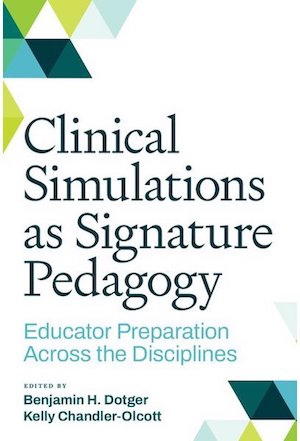Featuring School of Education Experts, “Clinical Simulations” Is an Essential, Cross-Disciplinary Guide to Effective Educator Development
 Syracuse University School of Education is a pioneer and international leader in the use of experiential, immersive methods of professional development for educators and other professionals, especially the use of live-actor simulations, otherwise known as clinical simulations.
Syracuse University School of Education is a pioneer and international leader in the use of experiential, immersive methods of professional development for educators and other professionals, especially the use of live-actor simulations, otherwise known as clinical simulations.
Now a new book—published by Harvard Education Press—gathers case studies, analysis, and research that illustrate exactly why clinical simulations have emerged as one of the most powerful tools for the professional preparation and continuing education of teachers, counselors, and school leaders.
Edited by Professor Ben Dotger, Director of the Center for Experiential Pedagogy and Practice, and School of Education Interim Dean Kelly Chandler-Olcott, Clinical Simulations as Signature Pedagogy: Educator Preparation Across the Disciplines features chapters by current and former Syracuse University faculty on the use of simulations in mathematics and science education, physical education, educational leadership, counseling, and inclusive education.
The editors and chapter authors will sign copies of the book at a launch event on March 31, 2022, from 4 to 6 p.m. in the Jacquet Education Commons in Syracuse University’s Huntington Hall.
“Clinical simulations are derived from medical education’s use of standardized patients, actors trained to approximate various health concerns,” explains Dotger. “By presenting original case studies, we explain how simulations provide a similar, safe shared-learning environment for educators that closely approximates authentic problems of practice. In fact, simulations have emerged as a signature pedagogy across education preparation at Syracuse University, and other institutions have taken note. Representatives from MIT, University of Michigan, Vanderbilt University, and elsewhere have visited Syracuse to understand this method.”
“The theory that clinical simulations rests upon is that powerful learning takes place when engaging in realistic, immersive situations,” says Interim Dean Chandler-Olcott. “By walking through our examples, readers will learn how simulations offer experiential learning opportunities that center on meaningful problems and contexts, emphasizing knowledge and skills that transfer from pre-service preparation to in-service practice.”
“My co-authored chapter explores the use of clinical simulations for disability, difference, and inclusive education across several School of Education programs,” says Christine Ashby, Director of the School of Education’s Center on Disability and Inclusion. “I see tremendous potential for simulations to address anti-racism, equity, and inclusion. In addition to creating opportunities for our students to engage with these topics, sharing data across our programs creates a space to hold our School accountable to the principles and values we espouse.”
Reviewing the book, Elizabeth Dutro, Professor of Education at the University of Colorado-Boulder, writes, “Dotger and Chandler-Olcott invite readers into the fascinating world of clinical simulations. With commitments to K-12 students at its heart, this volume provides richly contextualized, research-grounded, and inventive illustrations of how teacher and counselor educators can draw on simulations to enrich their pedagogies and programs.”
First applied to educator preparation at Syracuse University in 2007, the development of SU clinical simulation programs has received external funding from the Arthur Vining Davis Foundations, Institute for Education Sciences, National Science Foundation, and Spencer Foundation.
In recent years School of Education faculty have expanded the use of clinical simulations beyond teachers, counselors, and school leaders. Most notably, a collaboration with the Institute for Veterans and Military Families received a 2019 Syracuse University CUSE Grant. VET-SIMS have helped to prepare student veterans to navigate the unique challenges of adjusting to campus life. Other applications in development include live-actor simulations that focus anti-racism and disability and inclusion topics.
“Clinical simulations are dynamic and engaging. There is no option to sit quietly at the back of class,” notes Dotger. “At the same time, they are welcoming, allowing professionals to bring together what they’ve been taught and put it into action in an environment that challenges them but that also allows for mistakes.”

[…] Chandler-Olcott, interim dean of the School of Education. She and Dotger have co-edited a new book, Clinical Simulations as Signature Pedagogy: Educator Preparation Across the Disciplines. The book features chapters by current and former Syracuse University faculty on the use of […]